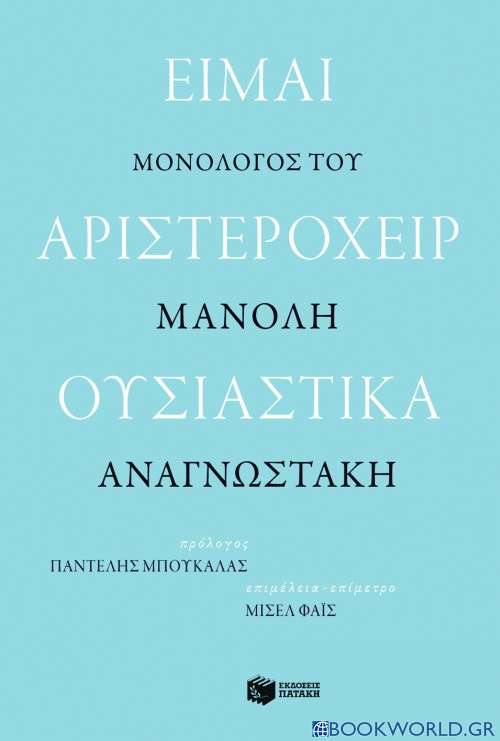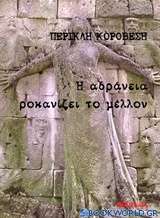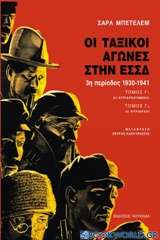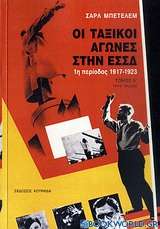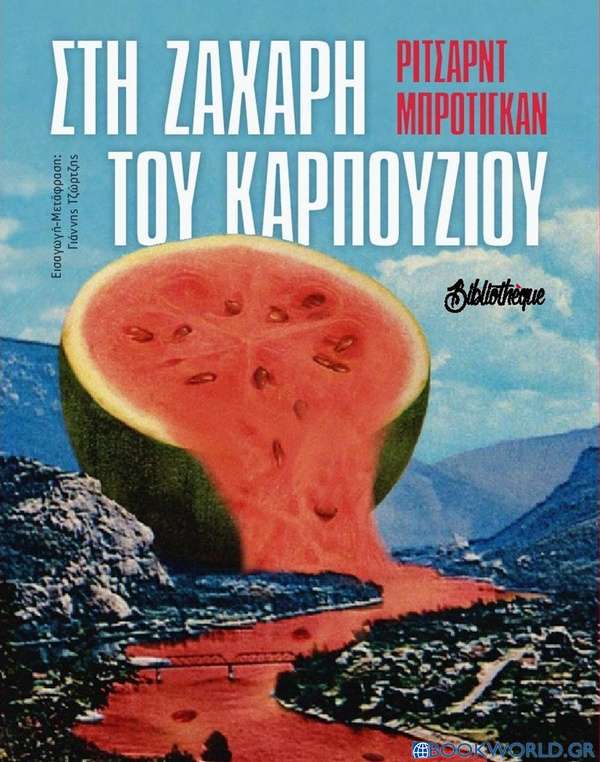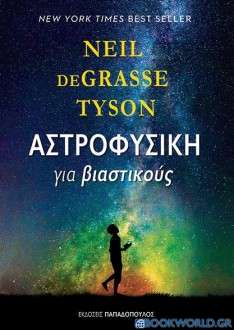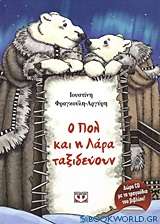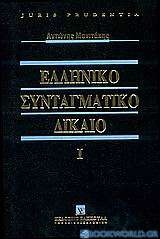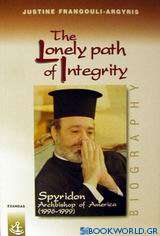
The Lonely Path of Integrity is not merely an authorized biography of Archbishop Spyridon, an overview of his "works and days," as they unfolded during his tumultuous three-year ministry (1996-1999) at the helm of the Church of America.
More than a simple portrayal of a religious leader, who from an early age was destined for the cloth, the book endeavors to shed light on the journey of a child who was born in America, grew up in Greece, was educated in Europe, and served the Church for 25 years in Switzerland and Italy as a cleric of the Ecumenical Patriarchate before coming full circle and ending up in his native America as Archbishop.
A careful reading of his multifaceted life and ecclesiastical career reveals a man who brought luster to the Orthodox Church in Italy and America as he strove to preserve Byzantine Orthodox tradition and to ensure the survival of Hellenism in the Diaspora. He lived by and ultimately fell defending the banner of "Orthodoxy-Hellenism," intertwined notions on whose axis his turbulent career was doomed to turn.
The book attempts to take a judicious, well-documented look at the personality of a church leader assailed by exponents of an arrogant conception of church governance. It dispels the illusion that the Greek-American community could emerge unscathed from the incessant manipulation by the back rooms of power.
This biography focuses mostly on Spyridon’s three-year ministry, from the rise to the fall of the fifth Archbishop of America. From his very enthronement, it became evident that his tenure bore an "expiration date." The heightened interest in this Archbishop arises from the role he was destined to play in events unique in the Orthodox Church’s centuries-old history, events that presaged the future of the Greek-American community.
The frenetic schemes originating from Orthodoxy’s center in Constantinople wounded not only the Church of America but also the whole Greek-American community.
The ousting of two Archbishops, Iakovos and Spyridon, from the Archdiocese of America within a span of three years is unprecedented in the annals of the Greek Orthodox Church. These developments ultimately throw into question the very foundations of her polity, structure, and canon practice.
The strategy used for the removal of both church leaders was also unparalleled. Far from yielding to pressure, the Phanar instigated the events. The tactics that divided the Greeks of America into factions lay the Ecumenical Patriarchate open to charges of neo-papism. This has caused nearly irreparable harm to relations between Greek Orthodox and other Orthodox communities.
All during Archbishop Spyridon’s tempestuous three years in office, power brokers spun a web of Byzantine intrigue. Their machinations spread through the Phanar involving Metropolitans, priests, laypersons, Greek-American media, and major Greek and American newspapers.
Patriarchate cohorts in America played a decisive role in concocting and disseminating a crisis throughout the Church of America and indeed throughout the entire Greek-American community. Later, the Greek Government, aces up its sleeve, entered the scene.
Thus, the game quickly took on the color of money and power. It permeated the Church’s relations with the Patriarchate, the Greek State, the clergy in America, and prominent Greek-Americans, threatening the unity of Orthodoxy and Hellenism in America.
The clergy regarded the restoration of the Orthodox Byzantine tradition in the Archdiocese of America as the thin end of the wedge. Equally, the Archbishop’s intent to redefine Greek-American identity in order to safeguard Hellenism in the American melting pot alarmed the champions of the Americanization of Orthodoxy-a movement that peaked in the 1970s with the introduction of English into the Divine Liturgy.
The upshot of the three-year struggle was the consolidation of the autocephalous movement in the Church of America, the revival of partisanship among Greek-Americans, the marginalization of the vital issues facing this community and the now firmly entrenched belief that the Patriarchate aims at all costs to diminish the role of the Archbishop of America.
Archbishop Spyridon, now withdrawn from active ministry, has consented to put on record-through his notes, diary, and archives-the dramatic triennium, which has left an indelible mark on Hellenism in America.
Sources for the recording and assessment of the events include the Archbishop himself, people closely associated with him on a personal or professional level, the Greek-American and Greek media, as well as the American press, and finally the author’s personal experience from witnessing the events as a journalist.
| Τίτλος βιβλίου: | The Lonely Path of Integrity | ||
|---|---|---|---|
| Υπότιτλος βιβλίου: | Spyridon, Archbishop of America (1996-1999) | ||
| Εκδότης: | Εξάντας | ||
| Συντελεστές βιβλίου: | Φραγκούλη - Αργύρη, Ιουστίνη (Συγγραφέας) Cox, Geoffrey (Μεταφραστής) Stamatelos, Jerry (Μεταφραστής) Phillips, Charles (Επιμελητής) | ||
| ISBN: | 9789602564912 | Εξώφυλλο βιβλίου: | Μαλακό |
| Στοιχεία έκδοσης: | 2002 | Διαστάσεις: | 21x14 |
| Κατηγορίες: | Γενικά Βιβλία > Μαρτυρίες - Βιογραφίες - Αυτοβιογραφίες - Ντοκουμέντα | ||

Κοροβέσης, Περικλής, 1941-2020
Ο Περικλής Κοροβέσης (20 Ιουλίου 1941 - 11 Απριλίου 2020) γεννήθηκε στο Αργοστόλι. Σπούδασε θέατρο με τον Δημήτρη Ροντήρη, σημειολογία με τον Roland Barthes και παρακολούθησε μαθήματα με τον P. Vidal Naquet στο Παρίσι. Από μικρή ηλικία μετείχε ενεργά στο μαχητικό δημοκρατικό κίνημα της Αριστεράς. Φυλακίστηκε και εξορίστηκε επί χούντας. Το πρώτο του βιβλίο, "Ανθρωποφύλακες" (1969), μεταφράστηκε σε πολλές γλώσσες. Εκτός από πεζά, έγραψε θέατρο, παιδικά και, τελευταία, ποίηση. Παράλληλα με τη συγγραφική του δραστηριότητα, διατηρούσε μόνιμες στήλες στην "Ελευθεροτυπία" και στην "Εποχή' και στο περιοδικό "Γαλέρα". Μεταξύ 2007-2009 διετέλεσε βουλευτής του ΣΥΡΙΖΑ στην Α' περιφέρεια Αθηνών.
Έργα του:
"Ανθρωποφύλακες" (μαρτυρία), Στοκχόλμη 1969
"Κοινός τόπος" (κείμενα), 1976
"Περιγραφή AGCTTGA+TCGAACT" (Είκοσι πέντε κείμενα του Π. Κοροβέση, δεκατρείς ζωγραφιές του Χρόνη Μπότσογλου), 1980
"Γύρω από το νησί η θάλασσα" (μυθιστόρημα), 1982
"Η συνέλευση των ζώων" (μουσικό παραμύθι-μουσική Γ. Κουρουπού), 1983
"Ο Γιαννάκης και η Μαρδίτσα" (παραμύθι), με εικονογράφηση Κ. Δίγκα, 1986
"Ατάμ Αλ' Ακ" (μουσικό παιδικό θέατρο-μουσική Π. Περράκη) 1987
"Τango Bar" (θεατρικό), 1988
"Εμπορία ειδήσεων" (άρθρα 78-90), 1990
"Επιχείρησις Ιουδίθ" (θεατρικό), 1992
"Γυναίκες ευσεβείς του πάθους" (μυθιστορήματα), 1995
"Μ' εξακόσιες λέξεις" (συλλογή κειμένων), 1996
"Νοσταλγία μνήμης" (αφήγημα), 1999 κ.ά.
[φωτογραφία: Κατερίνα Χατζηδημητρίου]
- Ανθρωποφύλακες (2022)
- Γυναίκες ευσεβείς του πάθους (2020)
- Tango bar (2019)
- Ανθρωποφύλακες (2019)
- Η συνέλευση των ζώων (2018)
- Στο κέντρο του περιθωρίου (2015)
- Ανθρωποφύλακες (2013)
- Η άμεση δημοκρατία στον 21ο αιώνα (2013)
- Παράπλευρες καθημερινές απώλειες (2013)
- Η πολιτική βία είναι πάντοτε φασιστική (2010)
- Οι άνθρωποί μου (2010)
- Αριστερή ανακύκλωση (2009)
- Γύρω από το νησί η θάλασσα (2008)
- Ανθρωποφύλακες (2007)
- Ανεπίδοτοι έρωτες (2007)
- Οι παπαγάλοι δεν διαβάζουν βιβλία (2005)
- Κούκλα από πορσελάνη (2004)
- Τρομοκρατία και άλλα δαιμόνια (2004)
- Νοσταλγία μνήμης (1999)
- Γυναίκες ευσεβείς του πάθους (1998)
- Κοινός τόπος (1998)
- Το καρότσι (1998)
- Εντός σχεδίου (;) (1998)
- Μ' εξακόσιες λέξεις (1996)
- Ανθρωποφύλακες (1994)
- Επιχείρησις Ιουδίθ (1991)
- Εμπορία ειδήσεων (1990)
- Tango Bar (1988)
- Ο Γιαννάκης και η Μαρδίτσα (1986)
- Ανθρωποφύλακες (1983)
- Γύρω από το νησί η θάλασσα (1982)
- Το παιχνίδι (1981)
- Περιγραφή AGCTTGA+TCGAACT (1980)





